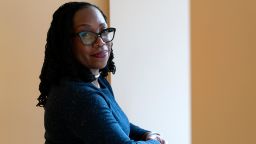Supreme Court Justice Sonia Sotomayor on Thursday said having four women on the Supreme Court – the first time the high court has had so many female justices – has had an impact on the “quality of the conversation.”
The increased share of women on the bench makes the conversation less adversarial and more collegial, she added.
“Because we are women, we don’t all think the same. We don’t all work the same,” Sotomayor said at Roosevelt University in Chicago.
Ketanji Brown Jackson’s confirmation in April made her the sixth woman on the bench’s history. Elena Kagan and Amy Coney Barrett join Jackson and Sotomayor as the four women who are currently serving.
“Ketanji Brown Jackson has just joined us. I can’t speak to what those changes will be. But I expect there will be some,” Sotomayor said.
Kagan similarly emphasized how important it was to have four women on the Supreme Court in a speech Friday at the University of Pennsylvania.
When it comes to the actual reasoning on the bench, Kagan said “being a woman doesn’t have all that much to do with it,” acknowledging that she and Barrett “agree on some things and disagree on others.”
But, she said it does make a difference for the audience to look up at the court to see “women’s faces and voices coming from all different directions.” Kagan added that “none of us are shrinking violets.”
During Sotomayor’s conversation Thursday, where she answered questions asked by retired judge Ann Claire Williams and students in the audience, Sotomayor, a liberal, also used warm words to describe her relationship with Justice Clarence Thomas, one of the court’s staunchest conservatives.
“I have disagreed more with him than with any other justice, which means we don’t come together on many cases,” she acknowledged.
But, Sotomayor said, she has seen Thomas care about people through the time she has spent with him.
“I can tell you that I spend time with him, understanding that he is one of the few justices who knows practically everybody in our building. He knows their name, he knows the things about their life, what their family is suffering. He’ll tell me, ‘You know that that person’s wife is sick right now, or that person’s child is having difficulty.’”
Sotomayor said she tries to be as courteous as Thomas is, but “he does it better.”
“I try to find the good in everybody. Because if I can treat them as people with good things inside of me, they can feel it. They can feel that there are things inside them that I value. And they’re more willing to talk to me.”
Sotomayor explained how she can be fond of Thomas’ humanity but strongly disagree with him on legal matters.
“He sees those legal issues much differently than I do. I tell people, you know, Clarence believes – just like him, because he grew up very, very poor – that everyone is capable of picking themselves up by their bootstraps. I understand that some people can’t reach their bootstraps. That’s a fundamental difference in how we view what the law can or should or does do for people But I can appreciate him.”
To that point, Sotomayor urged students not to give up on issues they care about.
“If you feel disenfranchised and let others fight for the things they think are right and you’re not willing to get up and fight for the things you think are right, you’re just giving it to them,” she said. “You are just walking away and not giving yourselves or the world a chance to get better. And I just won’t do that. You know, I just won’t.”





